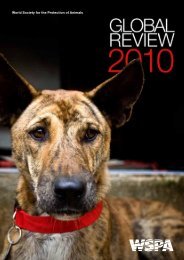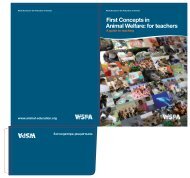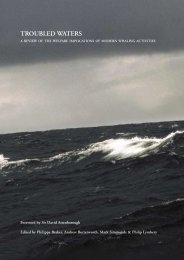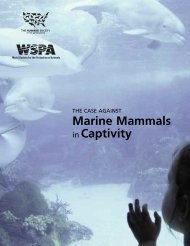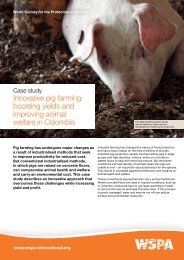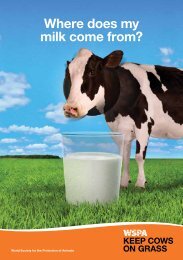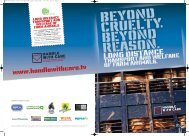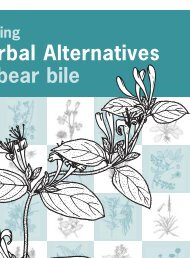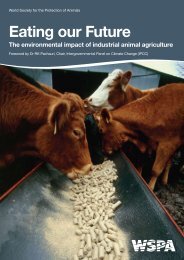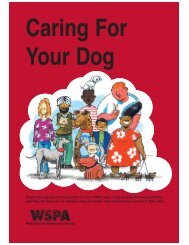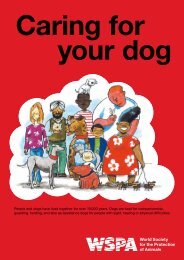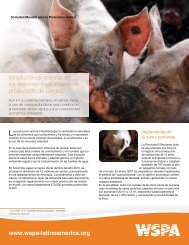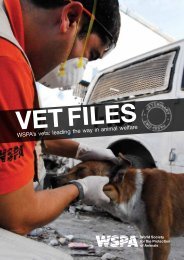Annex 4Submitted abstracts accompanyingposter presentationsMarine Patrol. In New Hampshire, <strong>the</strong> trap can betouched only by a conservation <strong>of</strong>ficer or <strong>the</strong> lobsterman.Annually, we involve thousands <strong>of</strong> volunteers in cleanups,and many are frustrated by <strong>the</strong> prevalence <strong>of</strong> traps on<strong>the</strong> beach and <strong>the</strong>ir inability to help clean <strong>the</strong>m up due to<strong>the</strong>se private property laws.In 2012, we surveyed and cleaned-up several <strong>of</strong> <strong>the</strong>Isles <strong>of</strong> Shoals, nine islands located 5 miles <strong>of</strong>fshore on<strong>the</strong> border <strong>of</strong> Maine and New Hampshire. Initial surveys<strong>of</strong> four <strong>of</strong> <strong>the</strong> nine islands revealed a large amount <strong>of</strong>debris, including lobster traps and rope. In June 2012,we conducted a cleanup at Appledore Island, Maine, withassistance from a local fisherman and a Maine MarinePatrol <strong>of</strong>ficer. Of <strong>the</strong> 12 traps found on <strong>the</strong> island, 10were deemed unfishable, and 2 were left on <strong>the</strong> island for<strong>the</strong>ir owners to retrieve. In August 2012, we cleaned StarIsland and White Island with <strong>the</strong> help <strong>of</strong> a fisherman, NHMarine Patrol and several volunteers. NH Marine Patrolsent an <strong>of</strong>ficer to inspect traps on White Island. Seventyninetraps were collected, and 3 were returned to <strong>the</strong>irowner. The White Island cleanup required <strong>the</strong> presence<strong>of</strong> <strong>the</strong> marine patrol <strong>of</strong>ficer, while <strong>the</strong> Star Island cleanupoccurred with permission granted via phone.Key factors to project success: <strong>the</strong> fortuitous availability<strong>of</strong> marine patrol <strong>of</strong>ficers on 2 <strong>of</strong> our cleanup days.We attempted ano<strong>the</strong>r cleanup <strong>of</strong> Appledore Island inSeptember, but <strong>the</strong> Maine Marine Patrol <strong>of</strong>ficer wasunreachable. Timing seemed to be everything with <strong>the</strong>secleanups, and building relationships and a rapportwith <strong>the</strong>se agencies is essential for a successfulcleanup effort.Challenges: While it is admirable that laws exist toprotect private property, <strong>the</strong>re is no law requiringfishermen to retrieve lost gear or that determines whentraps can be considered abandoned. There are no closedseasons in Maine or New Hampshire, so <strong>the</strong>re is no timewhen traps in <strong>the</strong> water can automatically assume tobe abandoned. Limited funding and staffing for marinepatrol means that while we feel cleanups are a priority,<strong>the</strong>y are not always a possibility.Recommendations: Establish connections with relevantagencies early in <strong>the</strong> project and continue to developthose relationships.Literature CitedGlenn, R. P., Whitmore, K. A., & Perry, D. N. (2012).Impacts <strong>of</strong> ghost fishing from American lobster traps.Presentation to <strong>the</strong> 2012 New England Derelict FishingGear Workshop, Portland, ME, February 28, 2012.Mattila, D. K. & Lyman, E. (2010). A note on <strong>the</strong>entanglement <strong>of</strong> large whales in marine debris. Workshopon welfare issues associated with <strong>the</strong> entanglement<strong>of</strong> large whales, April 13-15, 2010, Hawaiian IslandsHumpback Whale National Marine Sanctuary, Maui,Hawaii, USA. Retrieved 12/02/2013 from: http://www.iwc<strong>of</strong>fice.org/disentanglementsReduction and Impacts <strong>of</strong> Plastic litter in NigeriaCoastal Communities.Oshisanya, K. I. and Adegbile, O. M.Nigerian Institute for Oceanography and Marine ResearchP.M.B 12729 Victoria Island, Lagos, Nigeriakharphioshi@yahoo.comThe problem <strong>of</strong> marine litter is a common problem forcoastal local communities and o<strong>the</strong>r organizationsthroughout <strong>the</strong> world, studies and surveys employingmany different methodologies have been undertaken over<strong>the</strong> years to assess <strong>the</strong> problem. Collecting data on <strong>the</strong>volumes, types, origin, weight and o<strong>the</strong>r factors relatingto plastic litter and its impact on marine organisms is ara<strong>the</strong>r novel research in Nigeria. A survey <strong>of</strong> Folu andMagbon Alade in 2010 and 2008, both coastal fishingcommunities, located on <strong>the</strong> Western flank <strong>of</strong> Lagos,Nigeria revealed that waste disposal practice is very pooras refuse is disposed indiscriminately in <strong>the</strong> community.The beachfront is used as a waste dump sites for litterand rotten fish because waste collectors do not cometo <strong>the</strong>se communities. Ingested plastic litter is quitecommon in samples <strong>of</strong> dead and captured seabirdsand turtles, The known effects <strong>of</strong> ingestion <strong>of</strong> plasticlitter by birds and sea turtles include reduction in <strong>the</strong>absorption <strong>of</strong> nutrients in <strong>the</strong> gut, reducing <strong>the</strong> amount<strong>of</strong> space for food in <strong>the</strong> gizzard and stomach, ulceration<strong>of</strong> tissue and blockage <strong>of</strong> <strong>the</strong> digestive processes.Cases <strong>of</strong> entanglement <strong>of</strong> sea turtles by discardedfishing gears rendering <strong>the</strong>m unable to feed or swim arequite common. Unfortunately <strong>the</strong> marine litter menace is44
Annex 4Submitted abstracts accompanyingposter presentationsnot peculiar to <strong>the</strong> above mentioned communities alonebut typifies most coastal communities in Lagos exception<strong>of</strong> few privately owned beaches.The Lagos Waste Management Authority (LAWMA)has commenced a new initiative at <strong>the</strong> Bar-beach byproviding large bags to <strong>the</strong>ir staff stationed on <strong>the</strong>Bar-beach for waste collection, when <strong>the</strong>se bags arefull <strong>the</strong>y are deposited safely on <strong>the</strong> beach barrierfor onward collection by LAWMA trucks. Though thisreduces <strong>the</strong> volume <strong>of</strong> litter on this particular beachhowever lots <strong>of</strong> debris is still washed up on our beachesduring storm surges which is becoming more commonwith Climate change.Though LAWMA’s initiative is quite laudable however <strong>the</strong>initiative should be extended to include o<strong>the</strong>r beachesalong <strong>the</strong> Lagos Coast. There is need for concertedefforts to tackle marine litter menace by Increasinglyupdating information on <strong>the</strong> significance <strong>of</strong> <strong>the</strong> problemamongst coastal communities, beach users, maritimeorganizations, government and shipping industriesthrough research, awareness campaigns and beachclean ups.Key words: Plastic litter, sea birds, Marine turtles,LAWMAMonitoring and reducing <strong>the</strong> impact <strong>of</strong> ‘ghost’ fishingby derelict fishing trapscrabs during <strong>the</strong> winter months was closed affectingcommercial fishers who held current dredge licenses.A program involving cooperation between regulatoryagency personnel, commercial fishers, and scientistswas developed to provide supplemental income forfishers and help in restoring <strong>the</strong> stressed fishery.Commercial fishers were trained on <strong>the</strong> use <strong>of</strong> side-scanimaging units and employed to remove derelict fishinggear, mostly lost crab pots, during <strong>the</strong> winter. Integrating<strong>the</strong> commercial fishers into <strong>the</strong> planning and adaptivemanagement component <strong>of</strong> <strong>the</strong> plan helped boostfishers’ trust <strong>of</strong> <strong>the</strong> regulatory agency and <strong>the</strong> scientiststo overcome <strong>the</strong> inherent reluctance <strong>of</strong> <strong>the</strong> regulatedcommunity to productively engage. Commercial fisherswere able to earn income and removed over 32,000items <strong>of</strong> derelict fishing gear that directly affects <strong>the</strong> bluecrab fishery. By-catch was recorded for every piece <strong>of</strong>removed fishing gear, providing data on <strong>the</strong> winter catch<strong>of</strong> crabs, fish, terrapins, and several o<strong>the</strong>r organisms inderelict fishing gear and over 30,000 entrapped animalswere recorded over <strong>the</strong> project period. The resulting datahas been useful for various research projects, includinga Diamondback Terrapin habitat study. Through thispartnership, scientists were able to develop and testa biodegradable component to <strong>the</strong> crab pot, whichreduces <strong>the</strong> amount <strong>of</strong> by-catch from future lost orabandoned pots. Early engagement <strong>of</strong> stakeholders andcontinual dialog are important for natural resourceco-management success.Kirk J. Havens, Donna Marie Bilkovic, David Stanhope,Kory AngstadtCenter for Coastal Resources ManagementVirginia Institute <strong>of</strong> Marine Science, College <strong>of</strong> Williamand Mary, Post Office Box 1346, Gloucester Point,Virginia 23062, USAkirk@vims.eduThe blue crab, Callinectes sapidus, is a significanteconomic and ecologic driver in estuarine systems. In <strong>the</strong>recent years, harvest <strong>of</strong> blue crabs has dipped to historiclows. Virginia and Maryland responded to low harvestsby enacting a number <strong>of</strong> conservation measures. In <strong>the</strong>Commonwealth <strong>of</strong> Virginia, <strong>the</strong> practice <strong>of</strong> dredging for45



